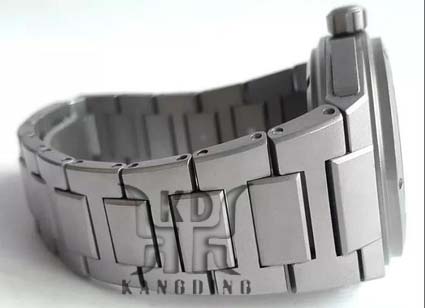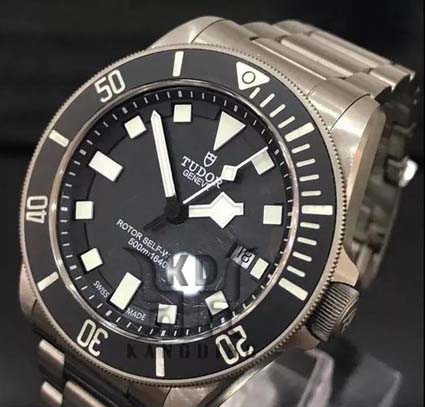Five Characteristics of Titanium Metal Watch Shell
Lead-in: After the development of watchmaking technology in Switzerland has encountered a bottleneck, watch brands have begun to attach great importance to the material of watches. Following the stainless steel and precious metal materials, there are novel materials such as ceramics, sapphire glass and titanium metal in the watch case material. Watch merchants value the excellent properties of these materials and use these materials as watch covers. For example, ceramics are very wear-resistant, titanium is very light and so on.

Titanium as a metal material category, its appearance improved the lack of previous watch material. Watchmakers took a look at the superior performance of this material, designers also love its avant-garde texture, with the continuous progress of technology, titanium watch has become the watch industry's new favorite. Titanium itself is similar to stainless steel at first glance. It has a silvery-gray luster, maintains its own color at room temperature for life, is never easily blackened, and has strong acid resistance and high hardness. Before becoming a watch material, it has long been widely used in aviation and marine diving. Titanium alloys are lighter and more corrosion resistant than steels. The main advantages of titanium alloys compared to steels are their low density and corrosion resistance.


Titanium as a metal material category, its appearance improved the lack of previous watch material. Watchmakers took a look at the superior performance of this material, designers also love its avant-garde texture, with the continuous progress of technology, titanium watch has become the watch industry's new favorite. Titanium itself is similar to stainless steel at first glance. It has a silvery-gray luster, maintains its own color at room temperature for life, is never easily blackened, and has strong acid resistance and high hardness. Before becoming a watch material, it has long been widely used in aviation and marine diving. Titanium alloys are lighter and more corrosion resistant than steels. The main advantages of titanium alloys compared to steels are their low density and corrosion resistance.

Before the mid-1970s, more than 85% of the titanium produced was used in the aviation industry.
Titanium's unique properties:
The density is half that of steel, excellent strength retention (to 1000 degrees Fahrenheit), and environmental corrosion resistance is much higher than other metals. This makes it an ideal material for the construction of jet engines, rockets and spacecraft engines and aircraft frames.
Light weight watch
In recent years, large-diameter table diameter watch popular trend, If stainless steel or precious metal materials are used, the weight of the case plus the weight of the movement can be imagined, which is an unacceptable weight for the average person. In view of this, the weight of the watch must be the opposite. As a result, the lightweight titanium metal was welcomed by fans. The weight of titanium is 47.90 atomic scale, which is nearly 50% lighter than steel. Therefore, the titanium wristwatch is only half the weight of the same steel wristwatch, which is undoubtedly a good choice for big watch enthusiasts.
Pressure resistance is not deformed
Titanium is 30% harder than steel, and its texture is extremely hard and strong. In addition, the excellent compression resistance of titanium metal, it also makes it a professional dive watch favorite material used, so that even if diving into the deep sea, will not be deformed.
Super anti-corrosion
Titanium has superior corrosion resistance and forms a tight and tough film on the surface when exposed to air. It can resist many substances that erode metal, especially the best anti-corrosion effect of seawater, so many professional diving watches have turned to titanium!
Lightweight, tough, and corrosion resistant, these advantages allow titanium to sit firmly on the throne of the noble metal. However, it is relatively difficult to popularize due to the complexity of the extraction and the high technical difficulty, resulting in the price of titanium watches being higher than that of stainless steel.
Titanium has a very good advantage as a watch material, summed up is:
1. Titanium watches are quite comfortable to wear because they are surprisingly light;
2. Titanium is hypoallergenic. It does not contain nickel and is comfortable to wear even when the skin is sweating.
3. Because titanium is harder than steel, titanium watches are more durable;
4. Corrosion resistance makes titanium particularly suitable for diving watches.
Can that titanium alloy be used as a mechanical watch body material?
Unfortunately, it cannot be. The main advantages of titanium alloys and steels are their low density and corrosion resistance, but their absolute hardness and strength are not as good as steel. And the processing is very poor, not suitable for watch internal parts, but the case still has its advantages, the problem is that it is low brightness, easy to scratch, to rely on coating (plating) layer to protect. Many holes on the deck are small, and irregular cutting requires more tools. If the splint is high in strength, it will be more difficult to process, and the hardness of the watch's movement to the splint material is not high, and at the same time, the anti-abrasion jewel bearing will be used. Of course, some gadgets have high-strength materials, but gadgets are easily processed by rules. Therefore, it is more appropriate to use a copper alloy for the splint material. Although rust and wear-resistance, copper is cheap, easy to cut, and can be solved in a relatively “low cost” way through plating, lubricants, ruby bearings, and steel parts.
Titanium is not a rare metal and it ranks ninth in the crust reserves. The supply of titanium ore can be maintained for at least 10,000 years. It is found in meteorites, moon rocks, the sun and other planets. However, the extraction process of titanium is relatively slow and expensive, which makes it expensive. For many years, high prices have limited the use of titanium in military and aerospace applications.
Titanium's unique properties:
The density is half that of steel, excellent strength retention (to 1000 degrees Fahrenheit), and environmental corrosion resistance is much higher than other metals. This makes it an ideal material for the construction of jet engines, rockets and spacecraft engines and aircraft frames.
Light weight watch
In recent years, large-diameter table diameter watch popular trend, If stainless steel or precious metal materials are used, the weight of the case plus the weight of the movement can be imagined, which is an unacceptable weight for the average person. In view of this, the weight of the watch must be the opposite. As a result, the lightweight titanium metal was welcomed by fans. The weight of titanium is 47.90 atomic scale, which is nearly 50% lighter than steel. Therefore, the titanium wristwatch is only half the weight of the same steel wristwatch, which is undoubtedly a good choice for big watch enthusiasts.
Pressure resistance is not deformed
Titanium is 30% harder than steel, and its texture is extremely hard and strong. In addition, the excellent compression resistance of titanium metal, it also makes it a professional dive watch favorite material used, so that even if diving into the deep sea, will not be deformed.
Super anti-corrosion
Titanium has superior corrosion resistance and forms a tight and tough film on the surface when exposed to air. It can resist many substances that erode metal, especially the best anti-corrosion effect of seawater, so many professional diving watches have turned to titanium!
Lightweight, tough, and corrosion resistant, these advantages allow titanium to sit firmly on the throne of the noble metal. However, it is relatively difficult to popularize due to the complexity of the extraction and the high technical difficulty, resulting in the price of titanium watches being higher than that of stainless steel.
Titanium has a very good advantage as a watch material, summed up is:
1. Titanium watches are quite comfortable to wear because they are surprisingly light;
2. Titanium is hypoallergenic. It does not contain nickel and is comfortable to wear even when the skin is sweating.
3. Because titanium is harder than steel, titanium watches are more durable;
4. Corrosion resistance makes titanium particularly suitable for diving watches.
Can that titanium alloy be used as a mechanical watch body material?
Unfortunately, it cannot be. The main advantages of titanium alloys and steels are their low density and corrosion resistance, but their absolute hardness and strength are not as good as steel. And the processing is very poor, not suitable for watch internal parts, but the case still has its advantages, the problem is that it is low brightness, easy to scratch, to rely on coating (plating) layer to protect. Many holes on the deck are small, and irregular cutting requires more tools. If the splint is high in strength, it will be more difficult to process, and the hardness of the watch's movement to the splint material is not high, and at the same time, the anti-abrasion jewel bearing will be used. Of course, some gadgets have high-strength materials, but gadgets are easily processed by rules. Therefore, it is more appropriate to use a copper alloy for the splint material. Although rust and wear-resistance, copper is cheap, easy to cut, and can be solved in a relatively “low cost” way through plating, lubricants, ruby bearings, and steel parts.
Titanium is not a rare metal and it ranks ninth in the crust reserves. The supply of titanium ore can be maintained for at least 10,000 years. It is found in meteorites, moon rocks, the sun and other planets. However, the extraction process of titanium is relatively slow and expensive, which makes it expensive. For many years, high prices have limited the use of titanium in military and aerospace applications.





